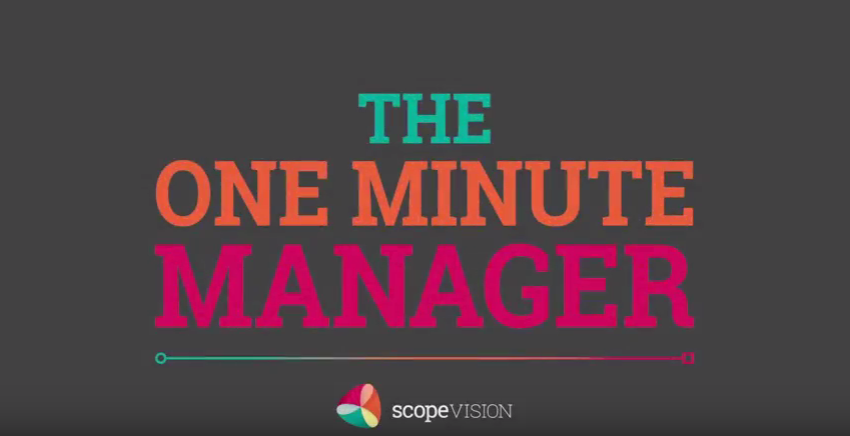One Minute Management in action!
The One Minute Manager is based on a book written by Ken Blanchard and Spencer Johnson about a young man who goes in search of an effective manager. His journey leads him to meet ‘autocratic’ managers who are only concerned about the results, (whilst their organisations gained their people lost) and ‘democratic’ managers who are only concerned about people, (their people gained whilst their organisations lost).
The young man was looking for an ‘effective’ manager, someone who was interested in people as well as results. In his journey, he comes across a manager who calls himself ‘the one minute manager’ and the book is based on the secrets of this particular manager’s success. How he gained big results through people.
The secret lies in setting one minute goals and following up with either one minute praise or one minute reprimands. Let's explore this further! You can watch the video below, or read on.
One Minute Goal setting
One minute goal setting is making a person aware from the outset of what exactly is expected of them. You decide on a goal and agree on the outcome and behaviour that you want to see from that person in completing it. One minute goals should be set every day, or at the beginning of every shift. Whenever you want to focus your team on achieving results.
An example of a one minute goal in action!
Let’s say you work in the hospitality industry and Simon is your employee.
"Simon, I want every table to be offered coffee and dessert tonight. Let’s ensure that everyone is treated like family and we afford them the service we would our dinner guests. It’s important that everyone leaves believing that they have been given first class service”.
One Minute Praise
After setting a one minute goal, the next step is to catch people doing something right and to give them ‘one minute praise’. One minute praise means praising people immediately (the minute you see them doing exactly what you asked them to do), telling them what they did right, how you feel about it and encouraging them to do more of the same. It shows that you are genuinely interested and that care about them and their success. One minute praise aims to catch people ‘doing something right’ rather than catch them ‘doing something wrong’; the way most managers operate. Praising people for producing good work ensures that they will want to do more of the same and be motivated to produce exceptional results.
How to give one minute praise
Tell people up front that you are going to let them know how they are doing. Praise them when you see them doing what you agreed together that they would do and tell them specifically what they did right. Let them know how pleased you are with their performance and how it positively affects the business. Then give them a minutes silence to let it sink in and then encourage them to do more of the same. If you want to and you think it is appropriate, you can shake hands with them or touch them on the shoulder to let them know how much you appreciate them.
One minute praise in action!
Let's continue on with our previous example.
"Simon, awesome effort on table 32. I heard you sell 5 desserts all with coffee. It’s that type of service that ensures us raving fans and we all know that they will go home raving about Chef’s homemade delights. Great effort, Simon. Keep it up! That’s exactly what I want to see more of!”
One Minute Reprimand
If Simon gets things wrong, he gets a one minute reprimand. One minute reprimands are given as soon as someone does something wrong and is not working towards achieving the agreed one minute goal.
The one minute reprimand has two parts:
- The first part tells the person clearly what they did wrong, how you feel about it and includes a moment or two of uncomfortable silence as you let your words sink in.
- The second part concludes with you telling them how much you think they are capable of and that you value them, it is just their behaviour in this instance that has let them down.
One minute reprimand in action!
"Simon, I’m disappointed. You just left table 45 without offering them dessert and coffee, as we agreed to do. That’s not offering them first class service. [Pause]. I know you can do better than that. I have heard you offering dessert and coffee to the other tables. Please lift your game to the standard I know you are capable of delivering. I want to spend the rest of this shift listening to you turning customers into raving fans, not delivering underwhelming service”
It’s critical that once the reprimand is over, it’s over. Unless they do it again! In which case you afford them another reprimand. When you give a reprimand remember to only criticise the behaviour and never the person.
Final thoughts on one minute management
- People who feel good about themselves produce good results.
- Help people reach their full potential, catch them doing something right and thank them for it.
- Always take the time to set goals with your team. The best one minute you spend is the one minute you spend with your people.
- Remember, we are not just our behaviour; we are the person managing our behaviour; so providing specific feedback on behaviours observed will see people do more of the same, or less of the same if we afford them a consequence.
- Feedback is the breakfast of champions so always be specific and honest with your team.
If you found this post useful, kindly tap the ❤ button below or leave us a comment! We would value your thoughts and feedback!











